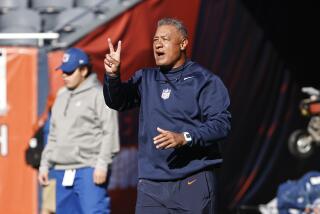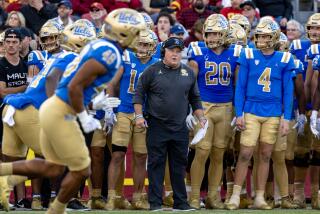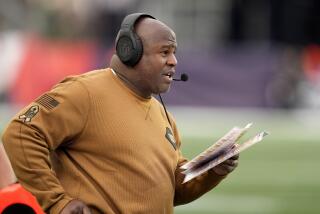Homer Smith dies at 79; former UCLA assistant football coach
Homer Smith, who served three stints as a UCLA football assistant coach and may have been college’s most intellectually gifted offensive mind, died Sunday in Tuscaloosa, Ala., after a long battle with cancer. He was 79.
Smith, who spent 37 of his 39 coaching seasons at the collegiate level, never received the acclaim of the headliners he served — UCLA’s Pepper Rodgers and Terry Donahue and Alabama’s Gene Stallings.
Smith was introverted and nomadic by nature, never spending enough time in one place to establish a school-specific legacy.
He was an assistant coach at Stanford, the Air Force Academy, UCLA, Alabama, Arizona and the NFL’s Kansas City Chiefs. He also was head coach at Davidson, Pacific and Army.
Smith will be remembered as one of football’s most creative and meticulous minds. Donahue has called Smith the best teacher of football he has ever known.
Smith was a thinker, philosopher and play-calling tinkerer. No other coach in history, perhaps, brought such mental acumen into a meeting room. Smith had degrees from Princeton, Stanford and Harvard.
Corky Simpson, the longtime Tucson sports columnist who covered Smith in his last two coaching seasons at Arizona in 1996 and ‘97, wrote: “Homer was grossly overqualified to be a football coach, let alone somebody’s assistant … the man was worthy of a higher calling — teacher or author or minister. But come to think of it, he was all those things rolled into one amazing professor of football.”
Smith was an eccentric and innovative coordinator who demanded perfection from his players. He first coached at UCLA in 1972-73 under Rodgers, was rehired by Donahue from 1980-86 and again from 1990-93.
At UCLA, Smith helped develop future NFL quarterbacks Steve Bono, Tommy Maddox, Rick Neuheisel, David Norrie, Tom Ramsey, Jay Schroeder and Matt Stevens.
Ramsey, the nation’s leader in pass efficiency in 1982, said Smith was a stickler for details.
“Homer Smith demanded you soak up knowledge,” Ramsey told The Times in 2009. “You not only had to know what 11 guys were doing on the field, you had to know what all 22 guys were doing. If you didn’t you weren’t going to be on the roster.”
Smith once invited a surgeon from the university’s medical center to speak about the importance of repeating the same thing over and over.
Smith could have excelled in several other professions. He earned an economics degree at Princeton, an MBA at Stanford and a master’s in theological studies at Harvard. Yet he was fascinated with the intricacies and possibilities of offensive football.
He wrote several books, including “Handbook for Coaching the Football Passing Attack.” He even published, in 1995, a novel, “A Game to Play.”
Smith, who was born Oct. 9, 1931, and grew up in Omaha, played fullback at Princeton, earning All-East and All-Ivy League honors. He rushed for 273 yards in a 1952 game against Harvard.
Smith began coaching in 1958 at Stanford before a four-year stint at Air Force. He spent seven years — five at Davidson and two at Pacific — as a head coach before joining Rodgers’ UCLA staff in 1972.
Running the wishbone offense, Smith’s 1973 UCLA offense set school records for total yards (470.6 per game) and rushing yards (400.3 per game).
He left UCLA in 1974 to become head coach at Army, where he spent five years before a bitter firing in 1978 coincided with the auto accident death of his brother Dean. Smith left coaching to pursue his theology degree at Harvard.
Donahue coaxed him back to UCLA in 1980, with Smith accepting the job in part, he said, because he needed the money.
Smith stayed through 1986 before taking a job with the Kansas City Chiefs. Two years later, Smith was back in college, at Alabama.
The highlight of that stay came in 1989 when the Crimson Tide, after spotting Mississippi a 21-point lead, scored 62 unanswered points.
Recalling that game this week in a tribute column, Tuscaloosa News writer Cecil Hurt said he asked Smith after the game what he was thinking during the comeback.
Smith responded with two words, in Latin: “Deo Gratis.” (Thanks be to God.)
Smith returned to UCLA in 1990. He gravitated back to Alabama in 1994 and 1995, where he worked under Stallings.
He spent his last two years as a coach at Arizona before retiring in 1997.
Simpson, the Arizona columnist, wrote that Smith “had the burning curiosity of a child and it drove him to scientific methods of investigation, critical thought and common sense.”
Smith is survived by his wife, Kathy; two daughters, Cari Carpenter and Kim Hall; and four grandchildren.
Funeral services will be held in Tuscaloosa. UCLA will hold a memorial service on campus June 12.
More to Read
Start your day right
Sign up for Essential California for the L.A. Times biggest news, features and recommendations in your inbox six days a week.
You may occasionally receive promotional content from the Los Angeles Times.







